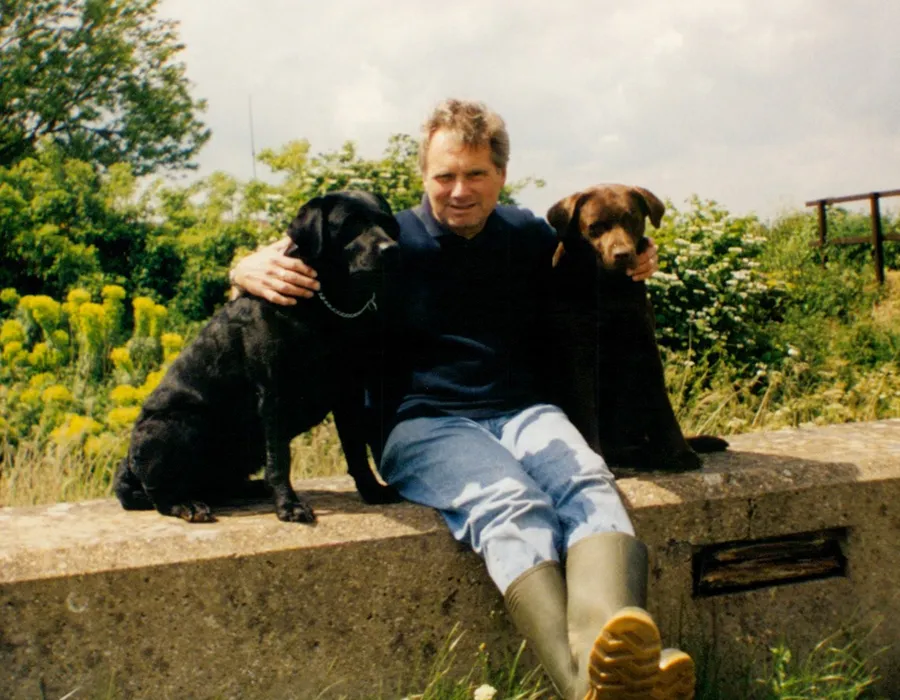In any history, the bits that stand out are the times when there were major changes and crises. As for looking on the bright side, there are ‘good news’ channels but they don’t tend to do very well – so, as with most news broadcasts, this account tends to feature the bad news rather than the good. As ever, though, it was the everyday work of looking after our patients that made it all worthwhile (stop yawning!) … and, lest this aspect is eclipsed, here is one example.
Paul enjoyed life. He used to burn the candle at both ends – working long hours and drinking more than he should. He’d often work and party 24/7 – surviving without sleep for days. Needless to say he paid the price and, at a relatively young age, he became severely disabled by his condition. He kindly allowed me to record him talking about his ill health in the hope that it would help others following in his footsteps. This can be very helpful as very often, when I was talking to patients, I’d see them thinking: “What does he know about this? Until you experience it yourself you can have no idea what it’s like!” There’s a lot of truth in this – and, if you can find a way of getting patients to help others with similar conditions, it can work wonders. So here’s the recording of Paul – still helping others after all these years.
In this video he mentioned that when he developed heart failure he’d had to sleep in a chair for months. This condition, called orthopnea, occurs because when you’re lying flat, blood from the lower body shifts to the chest, increasing pressure on the lungs. If the heart is weakened, it can’t pump this extra fluid out effectively, leading to the lungs becoming waterlogged. When you sit up, though, gravity comes to your aid.
In 2003, storm clouds started to gather over the practice. Dr Sherrin Nimmo, the wife of our local vet, was a partner. She kept her head down and got on with the job much to everybody’s satisfaction. Out of the blue, she announced she was leaving. She never made it clear why she was going but this was at a time when GPs were still responsible for covering nights and weekends. There were a variety of ways of dealing with this. For example, if there was a deputising service you could hand the entire responsibility over to it (at considerable cost) We opted for a service run by local GPs based in one of the buildings on the St Peter’s site … which meant that every GP had to do their share of evenings and weekends (seeing patients from practices spread over a fairly large area). I was not overly keen on this, preferring to concentrate my limited stamina on my own patients (and my family), and Shirrin gave the impression that she wasn’t keen either.
My guess (and it is only a guess) is that she looked at the workload involved and the remuneration and compared it with that of her husband … and thought: “This is a no brainer” This was a blow because the practice income (and the remuneration of staff) depended, at that time, to a significant extent on how many partners (in the traditional meaning of the word) you had. As previously mentioned, we realised we needed somebody with a well paid spouse to replace her – and these were increasingly hard to come by!
Whilst we were wondering how to deal with the situation, Dr McGeachy, unbeknownst to me, arranged a meeting with the PCT and asked if it would take over the practice. We’d had the impression throughout his tenure that his first loyalty was to the PCT rather than to the practice – and he was popular with the PCT hierarchy as he’d invariably done their bidding – e.g. cutting the amount we spent on our patients by way of prescribing costs.
Needless to say, the PCT couldn’t organise a piss-up in a brewery. The head honcho had given a glowing account of his past history when he took on the job … but this differed markedly from the opinion of The Consultant Staff Committee of Southend Community Care Services NHS Trust and the version given in Private Eye.
That said, the PCT people didn’t have to do much as the practice was already set up and we had a good team. All they had to do was fund it properly. I found myself in a difficult situation. I was pretty burnt out at this stage – the decades of running a practice had taken their toll. I’d taken a short sabbatical which coincided with my mother becoming ill and eventually dying – so it was fortuitous that I was able to spend more time with her – but the break didn’t fully recharge my batteries. I could in theory have taken over the practice and run it alone – trying to cope with a substantial drop in practice income. Running a practice, however, already constituted a massive financial responsibility – even when that responsibility was shared – and this was at a time when yet more changes in the NHS were threatened (all of which invariably added substantially to the workload.) On the other hand I could have given up and walked away – which would have been the sensible thing to do. I couldn’t quite deal with leaving the fate of my patients in the hands of the PCT, however, so I stupidly went along with this fait accompli.
Needless to say, it was a recipe for disaster.
Dr John Cormack
